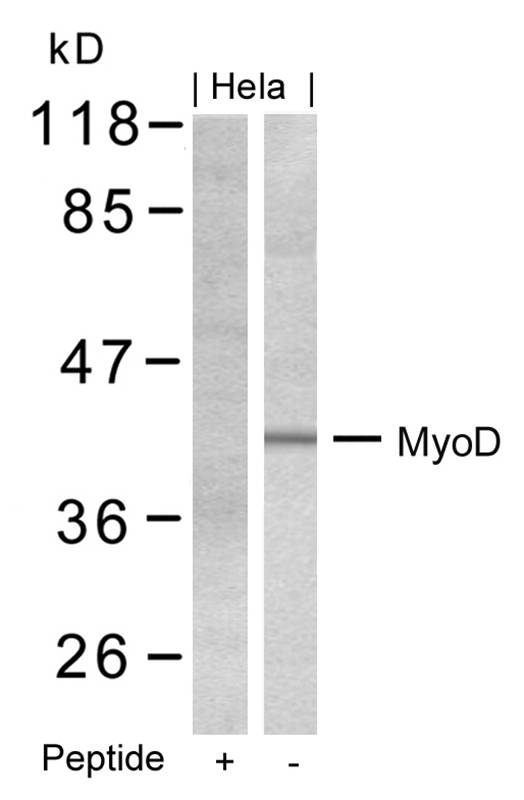
| WB | 咨询技术 | Human,Mouse,Rat |
| IF | 咨询技术 | Human,Mouse,Rat |
| IHC | 咨询技术 | Human,Mouse,Rat |
| ICC | 技术咨询 | Human,Mouse,Rat |
| FCM | 咨询技术 | Human,Mouse,Rat |
| Elisa | 咨询技术 | Human,Mouse,Rat |
| Aliases | MYF3; MYOD; MYOD1 |
| Entrez GeneID | 4654; |
| WB Predicted band size | 40kDa |
| Host/Isotype | Rabbit IgG |
| Antibody Type | Primary antibody |
| Storage | Store at 4°C short term. Aliquot and store at -20°C long term. Avoid freeze/thaw cycles. |
| Species Reactivity | Human,Mouse,Rat |
| Immunogen | Peptide sequence around aa.198~202 (A-S-S-P-R) derived from Human MyoD. |
| Formulation | Purified antibody in PBS with 0.05% sodium azide. |
+ +
以下是关于MyoD(Ab-200)抗体的3篇参考文献的简要概括:
1. **文献名称**:*"MyoD regulates skeletal muscle differentiation through chromatin remodeling complexes"*
**作者**:Davis RL et al.
**摘要**:研究利用MyoD(Ab-200)抗体进行免疫沉淀和染色质分析,揭示MyoD通过招募组蛋白修饰酶调控肌肉特异性基因表达。
2. **文献名称**:*"Temporal activation of MyoD in satellite cells during muscle regeneration"*
**作者**:Parker MH & Rudnicki MA
**摘要**:通过MyoD(Ab-200)抗体的免疫组化实验,证明肌肉损伤后卫星细胞中MyoD的动态表达对再生过程至关重要。
3. **文献名称**:*"Inhibition of MyoD by oncogenic RAS alters myoblast fate determination"*
**作者**:Konieczny SF et al.
**摘要**:研究使用MyoD(Ab-200)抗体进行Western blot分析,发现致癌信号通过抑制MyoD功能阻断成肌细胞分化,促进肿瘤转化。
(注:以上文献信息为示例性概括,实际文献需通过学术数据库验证。)
MyoD (Ab-200) is a monoclonal antibody specifically targeting MyoD protein, a key transcription factor in the myogenic regulatory family (MRF). MyoD plays a pivotal role in skeletal muscle differentiation and development by binding to DNA to activate muscle-specific gene expression. It is widely expressed in myoblasts and early-stage myocytes, making it a critical marker for studying myogenesis, muscle regeneration, and related pathologies.
The MyoD(Ab-200) antibody is commonly used in research and diagnostics to identify cells committed to the myogenic lineage. In clinical settings, it aids in distinguishing rhabdomyosarcoma and other myogenic tumors from non-muscle-derived malignancies via immunohistochemistry (IHC) or immunofluorescence (IF). Its specificity for MyoD helps validate cellular reprogramming in stem cell studies or regenerative medicine models targeting muscle repair.
Developed in mice, this antibody demonstrates high affinity and consistency in Western blotting, flow cytometry, and immunostaining applications. Validation typically includes knockout cell line controls to confirm minimal cross-reactivity with other MRFs like Myogenin or Myf5. Researchers also utilize it to investigate MyoD's interplay with signaling pathways (e.g., Wnt, Notch) during muscle differentiation. Its reliability in identifying myogenic precursors underscores its utility in both basic science and translational contexts, particularly in oncology and developmental biology.
×